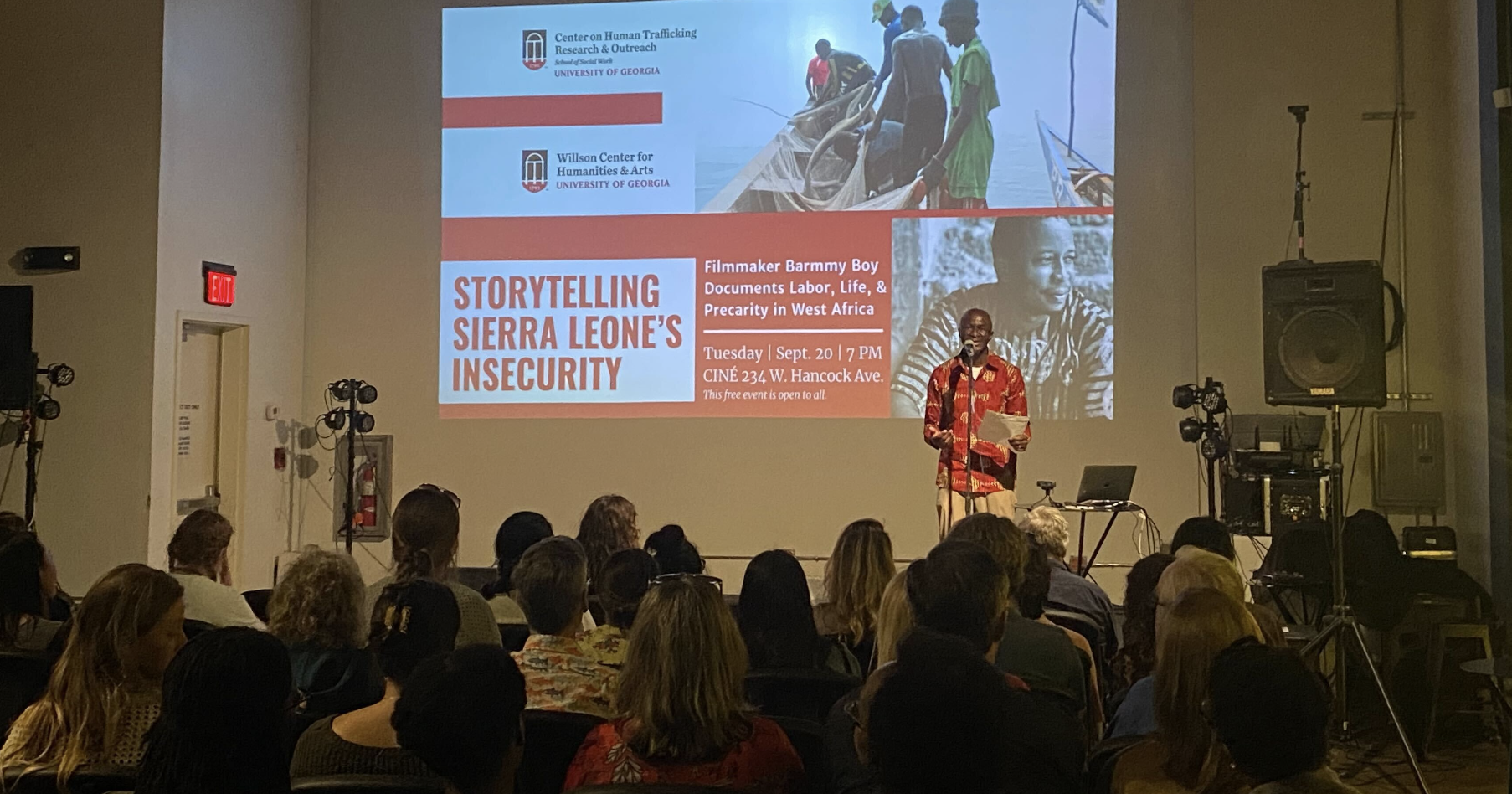UGA CenHTRO hosts human trafficking documentary screening at Cinè

The University of Georgia's Center on Human Trafficking Research and Outreach, or CenHTRO, and the Willson Center for Humanities & Arts hosted a free screening for the public at Ciné of Lansana “Barmmy Boy” Mansaray's short documentaries on child labor and human trafficking in Sierra Leone, Africa.
The event was organized by CenHTRO's director, David Okech, and the director of communications, André Gallant. The audience was a mixed group of UGA faculty, students and locals who attended to gain knowledge and perspective on the ever-growing global human trafficking problem.
The documentary's director, Mansaray, is a multimedia storyteller who has been nominated for both a Peabody and an Emmy award for his work. He has made it his mission to show the world the vulnerabilities the people within his country face in their daily lives.
“We give $70,000 to people like Barmmy Boy to tell the stories in their own words because he can tell the stories better,” Okech said. “He can tell it better than me because he lives there, he knows that place, he's gone through it.”
The first documentary of the night told the story of children who were forced to abandon school in order to join their parents in gold mining for money every day. These children were as young as 13 years old.
Mansaray's second short documentary was about how women and children are deceived into trafficking and sex work by fishermen on industrial boats that have taken over the coastal towns of Sierra Leone. Men abandon their wives and children for better fishing work, leaving their families to roam the streets searching for work of any kind.
“There's so many global and local factors that fall under the umbrella of human trafficking,” Gallant said. “Human trafficking really is a social problem, it's not kidnapping necessarily. It's very interpersonal and sometimes intimate — it's very connected to poverty.”
CenHTRO's goal is to bring awareness to these issues by hosting screenings and hiring filmmakers like Mansaray to tell these stories. Mansaray's point of view is significant because he lives directly in the locations where trafficking and child labor flourish.
“When we are doing human trafficking work, we are doing anti-inequality work, we are doing pro-development work in these countries,” Gallant said. “It's helping communities heal themselves so they aren't vulnerable to trafficking.”
CenHTRO's director hopes that the program will continue to gain traction and funding to create more multimedia projects to continue to spread awareness and make an impact for years to come.
“The goal … is not only to respond to state, local and national issues, but UGA is a global university so there is a focus on global issues,” Okech said. “This program will go on for the next 10 years, we hope, but for now we are funded until 2025.”
After the Q&A with the director of the documentaries, the audience chatted with the leaders of the event to see how they could get involved with the organization. CenHTRO is located on UGA's North Campus in the Center for Human Trafficking Research and Outreach building.
This “Eyes on Trafficking” story is reprinted from its original online location.
 ABOUT PBJ LEARNING
ABOUT PBJ LEARNING
PBJ Learning is a leading provider of online human trafficking training, focusing on awareness and prevention education. Their interactive Human Trafficking Essentials online course is used worldwide to educate professionals and individuals how to recognize human trafficking and how to respond to potential victims. Learn on any web browser (even your mobile phone) at any time.
More stories like this can be found in your PBJ Learning Knowledge Vault.
EYES ON TRAFFICKING
This “Eyes on Trafficking” story is reprinted from its original online location.
ABOUT PBJ LEARNING
PBJ Learning is a leading provider of online human trafficking training, focusing on awareness and prevention education. Their interactive Human Trafficking Essentials online course is used worldwide to educate professionals and individuals how to recognize human trafficking and how to respond to potential victims. Learn on any web browser (even your mobile phone) at any time.
More stories like this can be found in your PBJ Learning Knowledge Vault.
